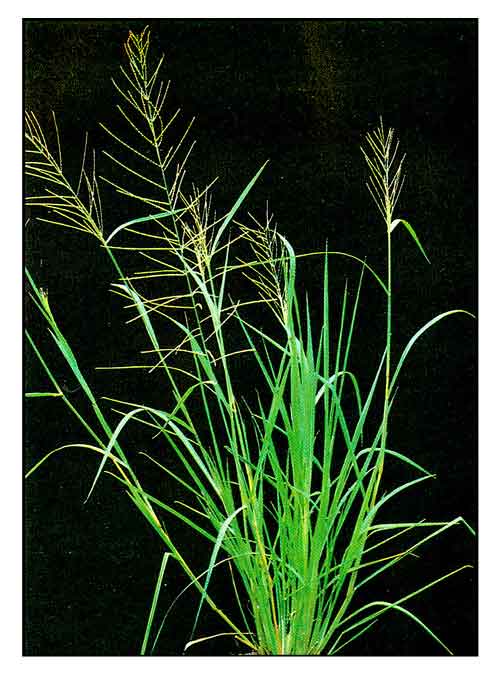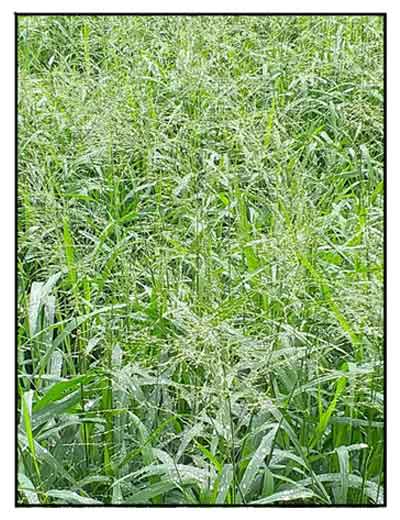 Gen info Gen info
- Leptochloa is a widespread genus of plants in the grass family. Members are commonly known as sprangletops.
- Genus name is derived from Greek 'leptos', meaning 'thin', and 'chloa', meaning 'grass'
, referring to the inflorescences. (10)
Botany
- Malay-palay is a strongly tufted, annual or short-lived perennial grass; hollow, erect stems with glabrous leaves and fibrous roots, up to 120 cm tall. Leaves are smooth, linearm 10-30 cm long; ligule an inconspicuous membrane 1-2 mm long and deeply divided into hairlike segments. Flowers are loose panicles, 10-40 cm long, with many spike-like slender branches; two rows of spikelets each 2-3.2 mm long, purplish or green and 4-6 flowered. Seeds are brown, smooth or wrinkled, 6-9 mm long; an abundant seed producer. (11)
Distribution
- Native to the Phiippines. (1)
- Also native to Bangladesh, Borneo, Botwana, Cambodia, China, Hainan, Himalaya, India, Japan, Jawa, Kenya, Korea, KwaZulu-Natal, Laos, Lesser Sunda Is., Malaya, Myanmar, New Guinea, Northern Provinces, South China Sea, Sri Lanka, Sulawesi, Sumatera, Swaziland, Taiwan, Tanzania, Thailand, Vietnam, Zimbabwe. (1)
- Occurs in croplands, wetlands, swamps, or streams in open lowland regions of the tropics. In heavy or light soils, along streams and water courses, marshy grounds, and in upland and lowland rice fields.
(2)
- Invades sugarcane, vegetables, cotton, corn, soybeans, sweet potatoes bananas, pineapple, tea and other crops. Best known as a serious weed of rice.
(2)
 Properties Properties
- It can withstand waterlogged, drained, and moist conditions, which makes it a problem weed in rice fields.
(6)
- In Chinese traditional medicine, listed as a plant that can cause HILN (herbal-induced liver injury).
(7)
- In traditional Chinese medicine, unprocessed caper
(Leptochlora chinensis sterol) causes detumescence through inducing of diuresis. (8)
- Studies suggest herbicidal, hepatotoxic, antifungal, antitumor properties.
Uses
Edibility
- Seeds used as famine food.
Folkloric
- No reported folkloric medicinal use in the Philippines.
Others
- Fodder: A fodder grass; a livestock grazing feed grass specialty.
Studies
• Antitumor Activity / Renal Cell Carcinoma Cells: Study evaluated the antitumor activity of Leptochloa chinensis and its molecular biological mechanism against renal cell carcinoma 786-O cells. Leptochloa can weaken migration and invasion of 786-O cells. More importantly, it can block the mTOR pathway by inhibiting protein expression of p-mTOR. L. chinensis inhibits the viability and metastasis of 786-O by blocking the mTOR pathway. (3)
• Herbicidal Potential Activity / Stems: Study evaluated crude extracts from stems of red spragle (Leptochloa chinensis) for inhibitory activity on seed germination and seedling growth of seven tested plants (popping pod, Chinese cabbage, Chinese kale, barnyard grass, amaranthus, weedy rice and waxy corn. All crude extracts at concentrations of 0.5, 1.0, 1.5, 2.0, 2.5 g/L) inhibited seed germination and seedling growth of seven tested plants for 9-199% inhibition. Results suggest herbicidal potential of red sprangle against the seven tested plants and potential of crude stem extracts of red sprangle as bioherbicides as bioherbicides application in weed control. (5)
• Antifungal: Study evaluated the antifungal activity of ethanolic crude extracts of 24 medicinal plants, including Leptochloa chinensis against Fusarium sp (the pathogen of dirty panicle disease in rice). All 24 extracts showed significant inhibition of mycelial growth activity. Leptochloa chinensis showed 50, 53, and 63% inhibition at 5000, 7500 and 10,000 ppm, respectively. (9)
Availability
Wild-crafted.
|

![]()





